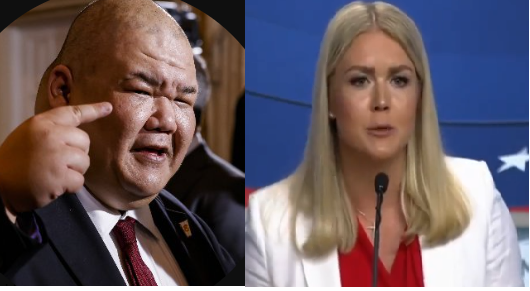
(Photo : X.com)
Trump Appoints Cheung, Leavitt in Major Communications Shake-Up
- Donald Trump has appointed Steven Cheung and Karoline Leavitt to manage White House communications.
- Cheung, a veteran of Trump's first term, will be the Director of Communications.
- Leavitt, the youngest Press Secretary, will be the face of the Trump administration.
- These appointments reflect Trump's strategy of relying on trusted allies and maintaining an adversarial relationship with the media.
In a significant development, US President-Elect Donald Trump has announced the appointment of two key members from his first term and campaign to manage White House communications. Steven Cheung, who was in charge of media relations for the campaign, has been appointed Assistant to the President and Director of Communications. Karoline Leavitt, the campaign's national press secretary, has been given the high-profile role of Press Secretary.
Steven Cheung, a seasoned veteran of Trump's first term, served as a Special Assistant to the President and Director of Strategic Response. His role involved dealing with arising challenges and planning responses to upcoming issues. Known for his acerbic statements, Cheung was the spokesperson for Trump's campaign. He also represented Trump directly in the media, including during his trial in a Manhattan court in the hush money case.
Cheung's role as the head of communications will primarily involve planning and running media relations, setting strategy and policies, and overseeing speechwriting. His work will mostly be away from the limelight. Cheung, 42, was part of the Trump campaign's inner circle, along with managers Susan Wiles, now appointed to Trump's chief of staff, and Chris LaCivita.
Trump's Trusted Allies in Key Roles
Cheung's career has seen him working in various Republican campaigns for president and governor. He honed his verbal skills at the Ultimate Fighting Championship, a mixed martial arts promoter, where he served as the communications director. He joined Trump's campaign for the Republican nomination in 2016 as the director of rapid response and moved with him to the presidential campaign and then to the White House, where he ultimately rose to the same job in 2017. He left the White House in 2018 and started his own company that was retained by the Trump campaign for the 2020 race. After several other assignments advising others in various races, he returned to the 2024 Trump campaign.
Karoline Leavitt, who was an assistant press secretary in Trump's first term, ran for Congress in 2022 from New Hampshire but was defeated. Despite her defeat, Trump praised her, stating, "Karoline is smart, tough, and has proven to be a highly effective communicator." At 27, Leavitt is the youngest person to take on the job of Press Secretary.
Leavitt will be the face of the Trump administration, appearing on TV around the world during the daily White House press briefings and when she speaks to the media during his travels. She will preside over the briefings, facing a media that is often hostile and answering for Trump's actions and statements. Leavitt was one of the campaign spokespersons and made several TV appearances sparring with journalists.
Leavitt's Journey to the White House
Leavitt's journey to this position is noteworthy. She grew up in a middle-class business family in New Hampshire and dove into politics at her college, Saint Anselm College, in Manchester. She was a fervent believer in Trump's America First anti-immigrant agenda and shared his disdain for traditional media companies. She once penned a column for the student newspaper at Saint Anselm College entitled Why Donald Trump just keeps on winning and the media doesn't get it, where she opposed the identity politics professed by many of her fellow students.
These appointments come at a time when the Trump administration is gearing up for its second term. The President-Elect's choices reflect his strategy of relying on trusted allies from his first term and campaign. The appointments also signal a continuation of Trump's adversarial relationship with the media, which he has often labeled as the "enemy of the people."
Historically, the roles of White House Communications Director and Press Secretary have been crucial in shaping the public image of the administration. The individuals in these roles are responsible for crafting the administration's message and communicating it effectively to the public. The appointments of Cheung and Leavitt, both of whom have previously worked closely with Trump, suggest that the President-Elect is seeking to maintain a consistent and combative messaging strategy in his second term.
* This is a contributed article and this content does not necessarily represent the views of btin.co.in









